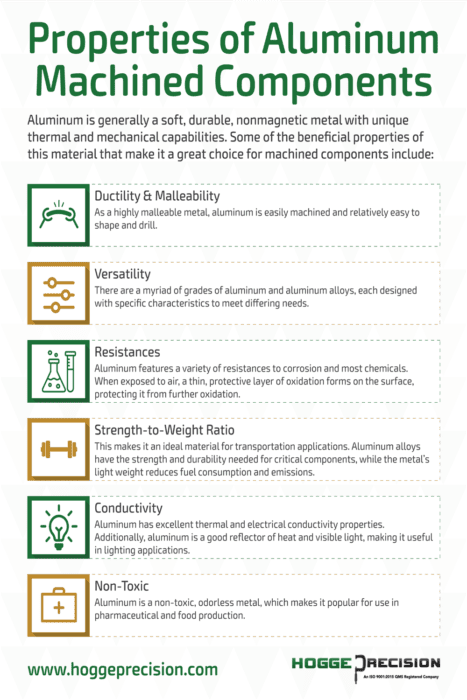 Computer numerical control (CNC) machining is a computer-aided manufacturing process used to create a wide range of parts and components for volumes ranging from prototyping through full-scale production. CNC machining is often the preferred method for manufacturing precision parts from aluminum. Aluminum is one of the most commonly used materials for its many favorable physical properties.
Computer numerical control (CNC) machining is a computer-aided manufacturing process used to create a wide range of parts and components for volumes ranging from prototyping through full-scale production. CNC machining is often the preferred method for manufacturing precision parts from aluminum. Aluminum is one of the most commonly used materials for its many favorable physical properties.
Properties of Aluminum Machined Components
Aluminum is generally a soft, durable, nonmagnetic metal with unique thermal and mechanical capabilities. Some of the beneficial properties of this material that make it a great choice for machined components include:
- Ductility and malleability. As a highly malleable metal, aluminum is easily machined and relatively easy to shape and drill.
- Versatility. There are a myriad of grades of aluminum and aluminum alloys, each designed with specific characteristics to meet differing needs.
- Resistances. Aluminum features a variety of excellent resistances to corrosion and most chemicals. When exposed to air, a thin, protective layer of oxidation forms on the surface of the metal, protecting it from further oxidation. Aluminum is also highly resistant to harsh chemicals, including most acids.
- Strength-to-weight ratio. Aluminum’s high strength-to-weight ratio makes it an ideal material for transportation applications. Aluminum alloys have the strength and durability needed for critical components, while the metal’s light weight reduces fuel consumption and emissions.
- Conductivity. Aluminum has excellent thermal and electrical conductivity properties. Aluminum is commonly used for major power transmission lines and is an excellent material for heat sink applications, such as computers, that require heat to be drained away rapidly. Aluminum is also a good reflector of heat and visible light, making it useful in lighting applications.
- Non-toxic. Aluminum is a non-toxic, odorless metal, which makes it popular for use in pharmaceutical and food production.
Common Aluminum Components and Applications
At Hogge Precision, we specialize in precision CNC machining aluminum parts and components for use in an expansive range of industries. Some of the sectors we commonly work with include:
- Automotive
- Aerospace & Defense
- Construction
- Energy
- Fluid, air, and motion control
- Industrial
- Manifolds
- Pharmaceutical
- Power distribution
- Transportation
Our aluminum CNC machining capabilities enable us to produce a diverse range of precision machined components and assemblies, including castings, manifolds, die castings, forgings, specialty valves, and transmission and switching components.
With our precision capabilities, the team at Hogge Precision can custom manufacture aluminum CNC parts to meet any unique or complex project requirement. Learn more about our most recent projects and the solutions we created:
- CNC Machining of an Aluminum Safety Coupling for the Valve Industry
- Horizontal Milling of an Aluminum Manifold for an Air Compressor
Aluminum Machined Parts from Hogge Precision
At Hogge Precision, we specialize in manufacturing standard and custom components from aluminum and many other materials. Alloys include 2011, 2024, 6061, 6262, 7075, as well as lead-free alloys 2033 and 6026. We have a wide range of capabilities, including CNC milling, CNC turning, Swiss machining, and screw machining.
As a full-service supplier, we offer multiple secondary services as well, such as KANBAN inventory management, custom barcode labeling, electroplating, anodizing, dry film lube, paint, heat treating services, and more. Our manufacturing facility is ISO 9001:2015-certified for quality management, ensuring that we produce only the highest quality parts.
To see how our precision aluminum part capabilities can support your project, please contact us or request a quote today.

Comments are closed